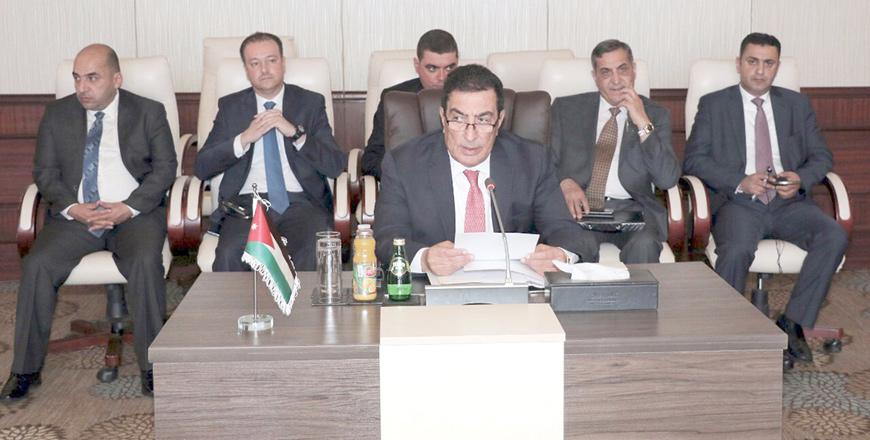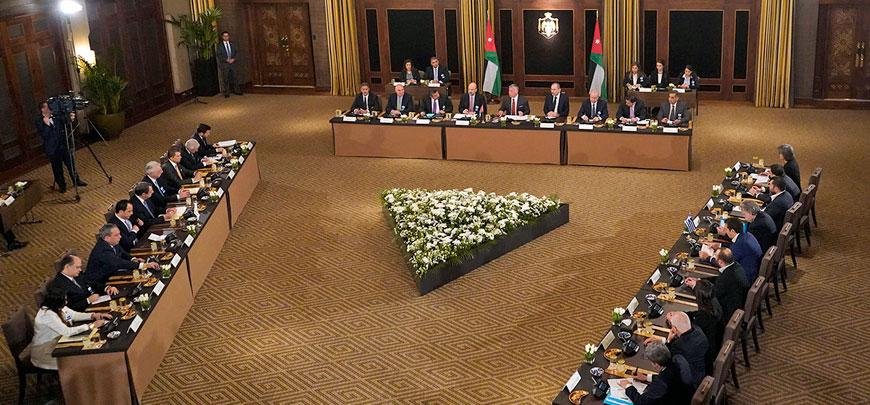You are here
Jordan, Greece seek to build on Nicosia summit
By JT - Mar 15,2018 - Last updated at Mar 15,2018

His Majesty King Abdullah meets with Speaker of the Greek Parliament Nikos Voutsis in Amman on Wednesday (Photo courtesy of Royal Court)
AMMAN — His Majesty King Abdullah on Wednesday met with Speaker of the Greek Parliament Nikos Voutsis over Jordanian-Greek relations and the means to develop them at all levels.
The meeting, attended by Lower House Speaker Atef Tarawneh, focused on ways to expand bilateral cooperation, especially in the legislative and economic fields, according to a Royal Court statement.
Discussions also covered investment incentives provided by the Jordanian economy, economic benefits generated by the strategic geographical location of the Kingdom and the free trade agreements connecting Jordan with several countries and blocs.
His Majesty highlighted the importance of building up on the outcomes of the trilateral summit that was held in Nicosia earlier in the year between Jordan, Cyprus and Greece, in a way that contributes to strengthening partnership and cooperation relations, as well as achieving regional security and stability.
Jordan will host the next trilateral summit, in which the three countries outlined their approach to issues of common interest, but no date for the meeting has been set yet.
The meeting also addressed the latest developments in the Palestinian issue.
In this regard, King Abdullah highlighted the importance of intensifying efforts aimed at pushing forward the peace process between the Palestinians and the Israelis, according to the two-state solution, the Arab Peace Initiative and international legitimacy resolutions, until the establishment of an independent Palestinian state with East Jerusalem as its capital.
The King also reviewed challenges facing churches in Jerusalem, highlighting the Jordanian role in preserving Islamic and Christian holy sites in the city as part of the Hashemite custodianship of these shrines.
In addition, the two sides went over regional crises and endeavours to forge political solutions to these conflicts, as well as efforts exerted in the war against terrorism within a holistic approach.
Also on Wednesday, Prime Minister Hani Mulki met with Voutsis over regional conditions and accelerating developments that affect the economic status of Jordan and other countries in the Middle East, the Jordan News Agency, Petra, reported.
Mulki highlighted new opportunities for economic cooperation, especially after the Kingdom has signed bilateral cooperation agreements with Egypt, facilitating the movement of ships and vessels to the Aqaba Port through the Suez Canal, where Greece can operate new marine routes.
The prime minister reiterated that the Palestinian issue remains the core regional conflict, stressing that there would be no peace or stability without a just, comprehensive solution that guarantees the establishment of an independent Palestinian state within the pre-1967 lines, with east Jerusalem as its capital.
For his part, Voutsis commended the “deep-rooted” relations between Athens and Amman, and voiced his country’s appreciation for the Kingdom’s key role in the region, stressing the importance of enhancing cooperation and coordination at all levels, especially in the parliamentary field.
Meanwhile, at a separate meeting with Voutsis, Tarawneh said that the Kingdom has succeeded in overcoming difficult conditions that have affected the region and cast their repercussions on Jordan.
Tarawneh noted that despite several achievements in the Kingdom, there is a feeling that the international community “abandoned” its moral responsibilities towards Jordan that hosts some 1.3 million Syrian refugees, as the support extended barely covers the costs of the humanitarian mission, according to Petra.
The Greek speaker said that his country believes in the importance of coalitions in facing terrorism and extremism.
On the Palestinian and Cyprus issues, he stressed the importance of implementing relevant UN resolutions, adding that the UN has done nothing towards solving them, especially since there are major powers that obstruct the execution of such decisions.
In this regard, he referred to the US’ move to recognise Jerusalem as the capital of Israel, which was rejected by most countries.
Related Articles
AMMAN — Parliament speakers of Jordan, Greece and Cyprus on Monday stressed on the outcomes of the trilateral summit of His Majesty King Abd
AMMAN — Lower House Speaker Atef Tarawneh on Thursday delivered the greetings of His Majesty King Abdullah to Greek President Prokopis Pavlo
Following is the full text of the declaration released at the conclusion of the Jordan-Cyprus-Greece second trilateral summit on Sunday:“We,


















